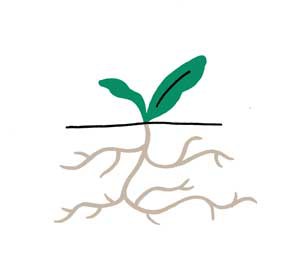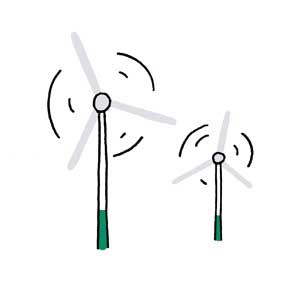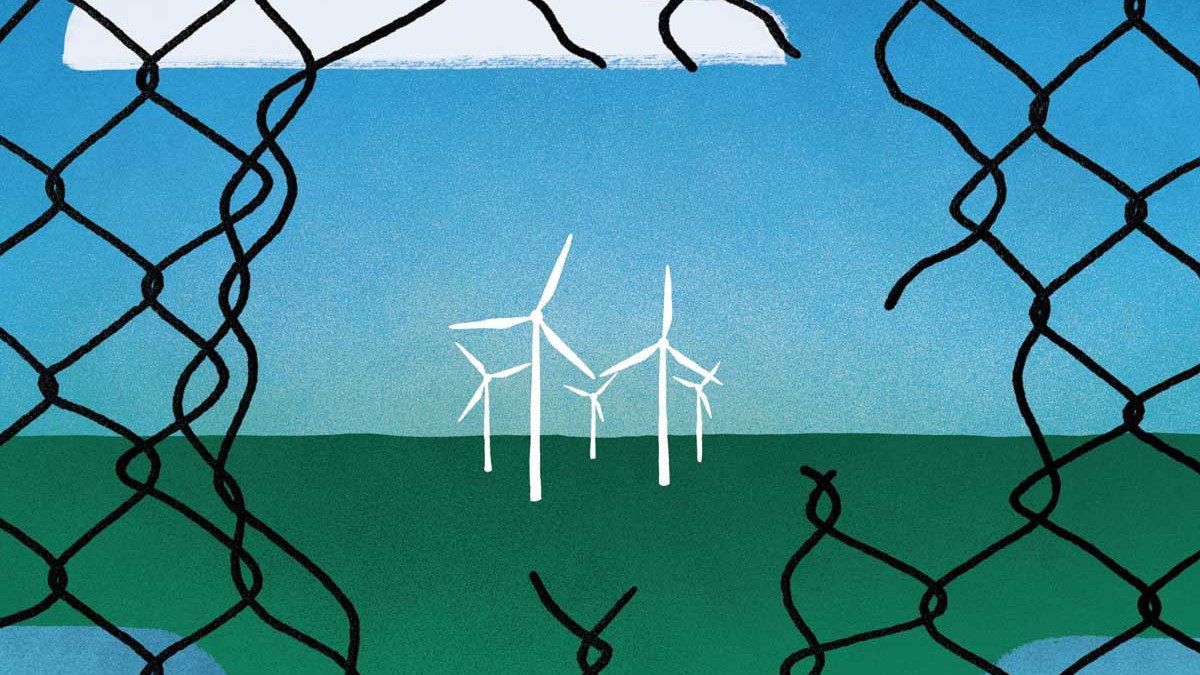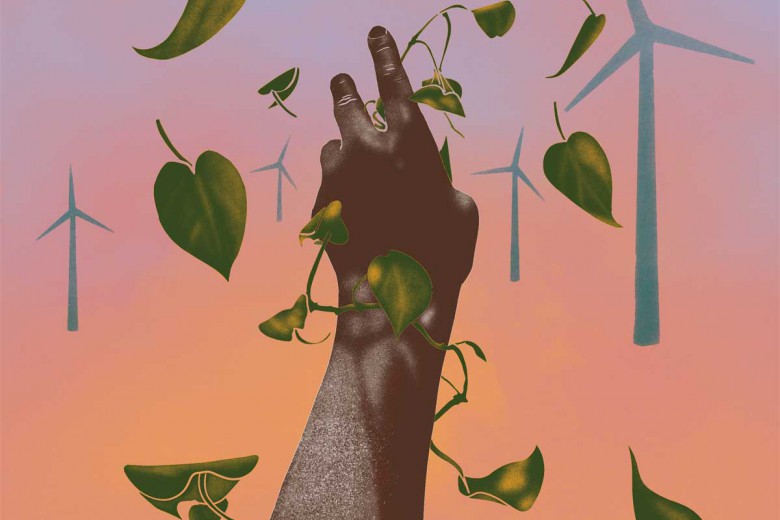I’ve spent much of the last four years of my PhD research interviewing fellow environmental justice activists in Canada, asking them – among other things – what they’d list as the biggest obstacles to the change they want to see. According to most of them, our economic system is the primary barrier to achieving justice and sustainability in Canada. To dismantle this obstacle, we need to understand it.
So, in my quest to understand, I sat down with six economists, most of whom specialize in ecological economics. I ask them two pressing questions: first, what are the biggest economic barriers to a just transition in Canada and, second, what can be done about these obstructions? This is a recap of our conversation, which touches lightly on topics that are debated in depth in the pages of academic journals.
Overcoming the barriers we identified, like the Canadian economy’s dependence on non-renewable resources, will be deeply disruptive to the current political and economic order. But that’s the point. A transition that doesn’t force us to dig up the foundations of our current society – which is built on extraction, accumulation, oppression, and theft – won’t be a just transition.
The experts
Bengi Akbulut, assistant professor, Concordia University
Akbulut’s research and teaching is in political economy, political ecology, and ecological economics. Her work focuses on state-society relationships, alternative economies, the commons, degrowth, and social movements.
Tim Crownshaw, PhD candidate, McGill University
Crownshaw is a PhD candidate in the department of natural resource sciences at McGill. His research focuses on non-renewable energy dependency in industrial societies and the dynamic constraints facing global energy transition pathways.
Daniel Horen Greenford, PhD student, Concordia University
Horen Greenford is a PhD student under the supervision of climate scientist Damon Matthews. He is currently working on policy solutions that combine the latest science with uncompromising ethical principles to ensure a just transition.
Bianca Mugyenyi, co-executive director of The Leap
Mugyenyi is co-executive director of The Leap, which exists to confront the intersecting crises of climate change, racism, and inequality. She has organized with Haiti Action Montreal and Missing Justice, and chaired the Canadian Federation of Students – Quebec as well as Montreal’s Centre for Gender Advocacy.
Ellie Perkins, professor, Faculty of Environmental Studies, York University
Perkins teaches ecological economics and community development at York. Her research, with local and international partners, links commons governance, climate justice, and ecological economics.
Leah Temper, research associate, McGill University
Temper is an ecological economist based at McGill University and the Autonomous University of Barcelona. She is the founder and co-director of the Global Atlas of Environmental Justice and a research associate with the Leadership for the Ecozoic program.
Simon Tremblay-Pepin, professor at Saint-Paul University, Ottawa
Tremblay-Pepin teaches social innovation at Saint-Paul University. His research focuses on democratization of the economy, media critique, and public finance.
Barrier 1: The Canadian economy depends heavily on non-renewable resources
Before my roundtable conversation with the six economists, I consult with Bianca Mugyenyi, a leading advocate for a just energy transition in Canada. To her, the main barrier is the Canadian state’s long-standing ties to extractive capitalism. “Not only does Canada have a massive oil and mining industry, but the most powerful sector of the Canadian economy, the banking sector, is heavily invested in carbon-intensive tarsands and other extractive projects,” she explains.
What would happen if we removed resource extraction from the Canadian economy?
Daniel Horen Greenford offers some stats. “About 8 per cent of Canada’s GDP [gross domestic product] comes directly from non-renewable resource extraction, while much more of the economy is dependent on the industry,” he says. “There are cascading effects throughout the country and global economy.”
“Not only does Canada have a massive oil and mining industry, but the most powerful sector of the Canadian economy, the banking sector, is heavily invested in carbon-intensive tarsands and other extractive projects.”
The narrative that our economy is dependent on extractivism can create a sense that the transition is not feasible. Leah Temper, on the other hand, argues that there are fewer and fewer jobs in the extractive sector. Oil prices are in decline, and much of the remaining oil and gas in Canada – like the tarsands – is “unconventional,” meaning it’s much more expensive to extract and refine.
Horen Greenford explains that “in the short term, growth in other sectors and the jobs created while building renewable energy infrastructure will offset a lot of the decline economically. But in the mid- to long-term, this significant loss in revenue for Canada must be dealt with.”

Barrier 2: Capitalism
“We cannot leave the decision-making to people who make money selling fossil fuels. They don’t want to change that situation,” Simon Tremblay-Pepin emphasizes. “The biggest problem hindering a just transition is capitalism. It’s the biggest threat to our capacity to transition.”
Within the current economic system, there is no incentive for governments to invest in energy transition. “Investment is always thought of from an atomistic perspective by capitalists, and from a short-term electoral perspective by governments,” he notes. “Ecological transition is a long-term project with short-term costly investment that will not be as ‘profitable’ as other investments like oil or war.” So unless they are forced to do so, governments won’t invest massively in public transport, sustainable long-distance travel, energy retrofits for buildings, job retraining, or building green energy industries.
Ellie Perkins points out that the social safety net that would protect vulnerable people through a transition has been dangerously eroded under capitalism and austerity. But everyone in our conversation agrees that something like a universal basic income would build a floor for society, below which marginalized people cannot fall during what will likely be a tumultuous and challenging transition.
“Universal health care, including drugs and dental, and education – these are the building blocks, the institutional supports that can facilitate a just transition […] and that build up the commons,” Perkins explains. “The whole idea of the commons used to be understood as the source of wealth and safety, of care and risk reduction for most people, especially marginalized people, up until just a few decades ago.”

Barrier 3: Ongoing colonialism
Perkins raises a critical point that shifts our conversation: “When we say there are no incentives for governments to do what’s right for people and the environment, that ignores the Indigenous [governance systems], for whom there is every incentive to do so.” There are counter-examples of Indigenous political systems all over Turtle Island where anti-capitalism and justice are prioritized and practised – like the Wet’suwet’en nation, fiercely defending their lands and waters from oil and gas pipelines while guided by their traditional systems of law and governance. “When we think about a just transition in Canada, we need to think about the barriers to understanding and respecting Indigenous lifeways,” she summarizes.
“Resource extraction is based on theft and expropriation of resources that Canada is not actually paying for and that don’t belong to those who extract and consume them,” adds Temper. “This makes it very profitable and easy for the economic system to be structured the way it is. If there was an actual need to not steal resources and expropriate them and dispossess people, a just transition situation would become a lot easier.”
Bengi Akbulut agrees that a just transition in Canada requires that we understand Canadian capitalism as a colonial project. The immense redistribution of resources that will characterize the transition must see land being returned to the peoples from whom it was stolen.

Barrier 4: The Earth’s finite carrying capacity
On a planet with a finite carrying capacity – one that’s actually shrinking because of our destruction of it – Tim Crownshaw argues that it will be difficult to provide a higher material standard of living for more people, particularly considering our profound dependence on non-renewable resources.
“It’s obviously true that there is no static carrying capacity in terms of number of people. It depends on levels of consumption per capita and modes of production,” says Crownshaw. “But it’s a logical fallacy to conclude that therefore carrying capacity can be trivially or indefinitely expanded, because the scale of economic changes required to do that (and the timeframe in which they need to take place) would be economically/socially catastrophic in the near-term. Sure, it can happen in theory, but only with unprecedented levels of global co-operation and willingness to scale back standards of living.”
“And in fact, the destructive use of non-renewable energy and the forms of economic activity it has enabled have lowered [the planet’s] long-term carrying capacity further by over-exploiting – and in many cases entirely eliminating – many renewable ecological stocks,” he adds. For example, as climate change wipes out vast numbers of pollinating insects, our ability to produce our food is diminished.
Many people will talk about material and energy use as synonymous with people’s well-being or quality of life. But, in all likelihood, the transition would require us to imagine new, less energy- and resource-intensive ways to live a good life. This would mean investment in public spaces and shared goods, and an emphasis on a “good life” of care and community rather than conspicuous consumption.
And if there is hope for justice, the decisions about what will be reduced – and how, and for whom – need to be made fairly and democratically.

Barrier 5: Constraining concepts of work and wealth
According to Horen Greenford, at certain stages of the transition, there may be less work to be had. “A post-extraction economy will cut mining of non-renewable resources substantially, but grow industries [devoted to] recycling these resources by a substantial proportion,” he says. But “required declines in consumer demand, paired with gains in production efficiency” have led him to speculate that the number of jobs in a post-transition economy would decline overall.
“I see seasonal work and deindustrialized agriculture with shorter work weeks as a necessary part of a post-transition and post-growth world,” he adds.
Akbulut, challenging Horen Greenford, suggests that a post-transition future could actually include more work. She explained that renewable energy has a lower energy return on investment (EROI), which means that more energy must be used in order to extract or produce energy from a resource.
“So switching to renewables would imply a major reduction of energy supply, which means we will need more of our resources allocated to just generate energy (if we do not radically cut down our energy use): more capital, more energy and more labour will be required to generate the same amount of energy,” she asserts.
Perkins believes that for a just future for labour in Canada, the economy needs to take into account unpaid work like care work and social reproduction, which is typically done by women. “We need to be paying [for] these forms of labour and also need to be paying people to do the important work of building local economies, co-ops, housing, and alternative transport systems.”
“Distributing paid and especially unpaid work more fairly, and making productive use of everyone’s abilities, is an important opportunity and challenge of the just transition,” she continues. As Akbulut chimes in, “failing to find a way to do this could make for a very unjust transition.”
“I see seasonal work and deindustrialized agriculture with shorter work weeks as a necessary part of a post-transition and post-growth world.”
Akbulut observes that in provinces like Quebec there’s been a trend of reclaiming social wealth by building co-operatives and non-profit social enterprises. Montreal, for example, is verdant with new and old co-ops like Bâtiment 7 (a co-op of co-ops), Les Sans-Taverne (a co-op brewery) and Coop Bioma (an urban agriculture co-op). But she notes that co-ops in general are mostly benefiting people who are already privileged – middle-class, white settlers.
It seems like it’s not just our concept of work but our concept of wealth, too, that is fixed and constraining. When I ask Akbulut to define social wealth, she tells me it includes everything from relationships of care between friends and family to “creativity and common knowledge” to “nature and ecological commons.” In sum, it encompasses the value of all of the things that make our lives livable and fruitful.
Perkins points out that we need to ask: to what extent are revenues from extraction funding economic redistribution in Canada? She notes that redistributing rents from the extractive economy will allow for a material base on which new livelihoods can be built.
Mugyenyi emphasizes that those getting the worst deal under the current system – Indigenous communities, migrant workers, and people suffering the health impacts of pollution from industry – should be the first in line to benefit from the opportunities of the new economy.

Barrier 6: The economy is fundamentally undemocratic
“Not only have we not begun to discuss restructuring our political systems or making radical changes to the economy, instead the government unilaterally decides that we’re going to spend [nearly] $5 billion to buy a pipeline without any sort of democratic debate or discussion on the issue,” observes Temper.
For Akbulut, the undemocratic nature of economic decision-making in Canada is the biggest economic barrier to a just transition. People have very little say over decisions about production, distribution, and consumption. Democratizing the economy means pushing to have more social oversight over corporations and over the market.
“There needs to be some way to hold industry and the market accountable for what is produced, what is invested in, what is not invested in,” she says. “And, importantly, there needs to be some kind of social oversight over the financial system, over money and credit, because money is one big part of what’s pushing our economic trajectory in the wrong direction.”
Akbulut explains that the contemporary financial system is built on interest-bearing loans. “You borrow $100, you need to return $100 plus interest – which creates an economy-wide imperative for economic growth.” And when private banks decide where to lend and what kind of activities to fund, “they tend to go for the ones that are likely to bring more profits – not the ones that are more socially and ecologically beneficial,” she continues.
Plus, “Contemporary money is not only the money issued by governments; it is actually a small portion of money. The larger portion is what is called horizontal money – money created by bank lending,” she adds. “When banks lend to a business or a household, they ‘create’ money, or rather a monetary circuit. […] So, banks have the power to create money, and that money is interest-bearing. Many have argued in favour of taking this away from banks and making lending a part of public oversight.”
“You borrow $100, you need to return $100 plus interest – which creates an economy-wide imperative for economic growth.”
When I ask how one goes about democratizing an economy, Akbulut replies that although democratizing global capitalism can sound rather ambitious, it becomes more doable as we democratize specific aspects of the economy.
“Smaller things can build on each other,” she explains. “Democratizing the monetary system can be aided by local-level complementary currency systems. Co-operatives or collective forms of production are ways to democratize production, but we also need meso- and macro-level institutions in order to bring economic decision-making into a societal sphere. Without those institutions, small-scale initiatives will not lead to [the] kind of systemic change that we want.”
To Horen Greenford’s mind as well, moving toward direct democracy is a necessary element of a just transition. He evokes a socialist democratic vision of the future – of decisions being made in town halls, through temporary, random, or elected recallable representation, and of scaling this up to the national and international level.
Crownshaw cautions against assuming that greater participation in decision-making will always produce sustainable decisions. For participants to make sustainable decisions, we’ll need to ramp up education on environmental issues and build social solidarity.

Barrier 7: Redistribution of power, wealth, and land is “politically unfeasible”
“We’re in a situation now where we need the economy to change and diversify, and to do that fast. And there are many embedded reasons why this is difficult – mostly because the powerful have set the system up for their own benefit,” Perkins laments. To her, wealth redistribution is the single most important tool for our society to be able to transition in a democratic way. But the political will to do so is impeded by counter-incentives built into our political-economic systems.
Horen Greenford points out, “There’s always money to bail out the status quo, but never any money for a transition.”
“Over the last few years, we’ve seen the government commit to spending billions on oil and gas subsidies, and billions more on transport infrastructure and auxiliary infrastructure like the Oceans Protection Plan,” he added. “That would be enough to retrain all the oil workers and retool a lot of the industry to produce other manufactured goods or energy technology.”
Perkins revises her earlier point: “I don’t really think capitalism is that rigid or that redistribution is impossible. I think things can change fast, and true democracy allows people to vote for redistribution rather than policies that favour the 1 per cent. It’s actually subversion of democracy – via media controls, poor education, massive spending by vested interests, corruption, et cetera – that prevents redistribution policies from being more widespread. But democratic politics, in theory, opens the possibility of income distribution.”
To Temper, as well, the economy is only as rigid as our ability to imagine a fairer system. Perkins likewise speculates, “Once redistribution, perhaps only in specific sectors, is shown to be possible and beneficial for many, it could lead to coalitions for fairer economies across the board.”

Breaking down barriers
I ask: what can be done to dismantle these formidable obstacles to transforming the economy? And particularly, what can be done about the fact that capitalism creates real disincentives to other solutions that have already been proposed?
For Crownshaw, the focus on incremental solutions in Canada is misplaced – there needs to be more emphasis on reinvention rather than reform. He says this process may look like a relocalization of economies, as demonstrated by the Transition Towns movement – but much larger and faster – and will challenge many of our collective preconceptions about the future.
Others argue that we need a diversity of tactics. Temper points out that “we need the smaller-scale, more reformist initiatives that will make our lives less energy- and resource-intensive. But we also need to keep pushing for the radical changes of dismantling capitalism and colonialism, and dreaming of much better ways of organizing economies and societies.”
Crownshaw offers the slightly ominous hope that “societies put under extreme circumstances evolve in surprising and spontaneous ways. We are very inventive, and we will reinvent things like livelihoods and production and consumption.”
But we do ourselves a disservice if we downplay the immense social, economic, and political disruption and unavoidable trade-offs this situation will bring – and their equity implications, since it is usually the marginalized who bear the brunt of rapid, disruptive change.
“We are very inventive, and we will reinvent things like livelihoods and production and consumption.”
“Canadians need to find our sense of rage and allow it to mobilize us,” emphasizes Perkins. “It’s time for national-level organizing involving marginalized communities and following Indigenous leadership. And grassroots organizing needs to be strong enough to challenge the undemocratic economic decision-making that’s been going on – to hold governments to account, to create the institutional safety nets and the building blocks of a just transition ourselves, and to shift the incentive structures that will drive our systems toward protecting life and justice. This is beginning to happen.”
As Mugyenyi puts it: “[W]e need to challenge inequity and corporate power. The economic system itself is a huge part of the problem and we need to build social movements that challenge the logic of endless growth and conspicuous consumption. We need to change our collective story away from the myth of endless extraction to an emphasis on caring for people and the planet.”
Temper has the last word: “A just transition in Canada may seem like a huge, insurmountable task,” she says. “But actually, if you look, there are so many stories of deindustrialization, of reinvention, of shifting economies, of redistributions, of land reform. Our imagination can be fuelled by sharing these stories. We need to recuperate these histories of transformation to help us remember what’s possible.”





_780_520_90_s_c1_c_c.jpg)

